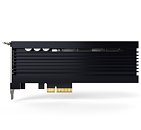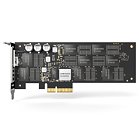Tuesday, January 30th 2018

Samsung Launches 800GB Z-SSD for HPC and AI Systems
Samsung Electronics, the world leader in advanced memory technology, today announced that it has launched an 800-gigabyte (GB) solid state storage drive-the SZ985 Z-SSD, for the most advanced enterprise applications including supercomputing for AI analysis. Developed in 2017, the new 800 GB Z-SSD provides the most efficient storage solution for high-speed cache data and log data processing, as well as other enterprise storage applications that are being designed to meet rapidly growing demand within the AI, big data and IoT markets.
"With our leading-edge 800 GB Z-SSD, we expect to contribute significantly to market introductions of next-generation supercomputing systems in the near future, enabling improved IT investment efficiency and exceptional performance," said Jinman Han, senior vice president, Memory Product Planning & Application Engineering at Samsung Electronics. "We will continue to develop next-generation Z-SSDs with higher density and greater product competitiveness, in order to lead the industry in accelerating growth of the premium SSD market."The new single port, four-lane Z-SSD features Z-NAND chips that provide 10 times higher cell read performance than 3-bit V-NAND chips, along with 1.5 GB LPDDR4 DRAM and a high performance controller. Armed with some of the industry's most advanced components, the 800 GB Z-SSD features 1.7 times faster random read performance at 750K IOPS, and five times less write latency - at 16 microseconds, compared to an NVMe SSD PM963, which is based on 3-bit V-NAND chips. The Z-SSD also delivers a random write speed of up to 170K IOPS.
Due to its high reliability, the 800 GB Z-SSD guarantees up to 30 drive writes per day (DWPD) for five years, or a total of 42 petabytes. That translates into storing a total of about 8.4 million 5GB-equivalent full-HD movies during a five-year period. The reliability of the new Z-SSD is further underscored by a mean time between failures (MTBF) of two million hours.
Samsung will introduce its new Z-SSD in 800 GB and 240 GB versions, as well as related technologies at ISSCC 2018 (International Solid-State Circuits Conference), which will be held February 11-15 in San Francisco.
"With our leading-edge 800 GB Z-SSD, we expect to contribute significantly to market introductions of next-generation supercomputing systems in the near future, enabling improved IT investment efficiency and exceptional performance," said Jinman Han, senior vice president, Memory Product Planning & Application Engineering at Samsung Electronics. "We will continue to develop next-generation Z-SSDs with higher density and greater product competitiveness, in order to lead the industry in accelerating growth of the premium SSD market."The new single port, four-lane Z-SSD features Z-NAND chips that provide 10 times higher cell read performance than 3-bit V-NAND chips, along with 1.5 GB LPDDR4 DRAM and a high performance controller. Armed with some of the industry's most advanced components, the 800 GB Z-SSD features 1.7 times faster random read performance at 750K IOPS, and five times less write latency - at 16 microseconds, compared to an NVMe SSD PM963, which is based on 3-bit V-NAND chips. The Z-SSD also delivers a random write speed of up to 170K IOPS.
Due to its high reliability, the 800 GB Z-SSD guarantees up to 30 drive writes per day (DWPD) for five years, or a total of 42 petabytes. That translates into storing a total of about 8.4 million 5GB-equivalent full-HD movies during a five-year period. The reliability of the new Z-SSD is further underscored by a mean time between failures (MTBF) of two million hours.
Samsung will introduce its new Z-SSD in 800 GB and 240 GB versions, as well as related technologies at ISSCC 2018 (International Solid-State Circuits Conference), which will be held February 11-15 in San Francisco.





8 Comments on Samsung Launches 800GB Z-SSD for HPC and AI Systems
I would really like to see this go against the 900P. Intel has some really tough competition
It also looks like it has pads free for a 1.6TB version with possibly even better performance.